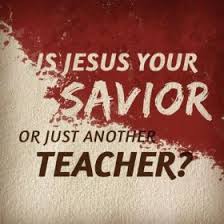
Those People

I would like to begin today by asking you a simple question. Is Jesus your Savior? I presume you answered this question by saying yes, so let me follow up the first question with a slightly harder second question. If you profess Jesus to be your savior, your profession itself presumes that you have something from which you need to be saved. What is it? You might be inclined to offer a generalized answer like “sin”, however I would ask you to be more specific. From what sin or sins do you need to be saved? Stop right here before reading further and think seriously about your answer.
What in fact does it mean to be saved? Throughout all of Paul’s writings it becomes clear that the salvation he is referring to is the gift of eternal life with God. In Acts:4:12 we have this verse: “There is no salvation through anyone else, nor is there any other name under heaven given to the human race by which we are to be saved.”
The name Jesus in Hebrew means “God saves”. God alone can forgive sin. The forgiveness of our sin and our salvation comes to us through Jesus’ death and resurrection. This was a gift freely given to us even though we are sinners and it is something that we cannot earn for ourselves.
It was through Adam, that we inherited our inclination to sin, and our sinful nature causes us to commit everything from seemingly innocent gossip and untruths to murder. But of course there is the good news and it is summed up in Luke 19:10: “For the Son of Man has come to seek and to save what was lost.”

Allow me to change the perspective now and ask you a slightly different question. Over the last several years I have written extensively about human brokenness. My ministry is called Broken Door Ministries, and as you all know for some time now I have been promoting the book The Broken Door. So here is the other question. Are you broken? Once again, I encourage you to stop and seriously contemplate your answer. If you are broken, how are you broken?
From emails I have received from readers and from comments made to me during my Broken Door Retreats, it seems people react differently to identifying themselves as broken verses identifying themselves as a sinner. For some reason the term broken seems to take on more gravity. It seems to carry a more negative connotation. Perhaps it implies to some that a broken person is a “bigger” sinner. It apparently is impossible for some individuals to apply the term broken to themselves. Perhaps it is just easier to only see others who we refer to as “THOSE PEOPLE” as the ones who are broken.
This reminds me of the verse from Luke 18:11: “thank you that I am not like the rest of humanity-greedy, dishonest, adulterous-or even like this tax collector.”

Words do have meaning and I guess I could have chosen a different word other than broken to describe our human condition perhaps one of these: smashed, shattered, fragmented, splintered, or crushed. Regardless of the word, the end result is the same. Do to our actions and our inherited nature all of us fall short and sin, and therefore I believe all of us have some degree of brokenness.
Why does any of this even matter? It matters because it appears to me that when it comes to those who prefer a word other than broken to describe themselves they fall into two categories. The first group is those people who clearly know they are sinners yet for semantics they prefer a word other than broken. If you fall into this group please choose whichever word best depicts your sinful nature. There does however seem to be a growing trend towards a second group of people. Those who make up this group tend to look in the mirror and conclude “I am OKAY”. This group of Christians sees themselves as doing everything right, they see themselves as following all of the laws, and they fail to see any brokenness in themselves no matter what word is used. Maybe you are in this group.

So is it possible that some of us have overcome our sinful nature and thereby avoided the broken human condition? I will allow Paul to answer that. Here is his take on this from Romans 3:23; “all have sinned and are deprived of the glory of God.”
There is no doubt that some people wrestle with more difficult sin in their lives than others. Many of us have recurring sins that we just can’t seem to overcome. Some people’s sins become public and they seem to wear the scarlet letter, for most of us however our sins remain well hidden and no one other than us knows our sins and how they are disrupting our relationship with God.

In a very strange way it might be a blessing if our sins are more noticeable. If we have glaring areas of brokenness or sinfulness in our life, at least we can be aware of them and repent and work at overcoming our faults. It is much worse if we are blinded to our own brokenness. If we fail to see our own sins we feel like it is only “THOSE PEOPLE” who have noticeable sins who are in need of being saved.
We have all received the great commission to go out to the ends of the earth with the good news of salvation. We are all called to participate in finding the lost and broken and bring them home to Jesus. This begs the question: “who are the lost and broken?”
So often in our churches today we set up ministries to reach those who we perceive to be broken. Usually we see these people as people who are “outside the doors of the church”. We seem to delineate the churched people from the unchurched people. My sincere hope in this email is that I might get you to see that the broken people that need you to reach out to them might in fact be the people sitting right next to you in the pew at church.

Finally when it comes to “THOSE PEOPLE” who are broken perhaps we can see that we too fit into that category and that we need to accept the reality that God may be calling someone sitting next to us in the pew to reach out and help us to overcome our brokenness. When we set up our ministries at our churches let’s remember that our call to bring people to Christ extends to those outside the doors of the church, those inside the doors of the church and to ourselves as well. We are all THOSE PEOPLE who need to be saved.
We all know the saying, “When you point one finger, there are three fingers pointing back to you.” Jesus said the same thing this way: “Don’t focus on the speck in your brother’s eye while ignoring the log in your own eye.” Let’s ask God to reveal our brokenness to us so that we can work at overcoming our own faults.
“If we say, “We are without sin,” we deceive ourselves, and the truth is not in us. If we acknowledge our sins, he is faithful and just and will forgive our sins and cleanse us from every wrongdoing. If we say, “We have not sinned,” we make him a liar, and his word is not in us.”
- What Is The Church’s Role In Society? - July 21, 2024
- The Thorn Remained - July 14, 2024
- The Confounding Nature Of Freedom - July 7, 2024
